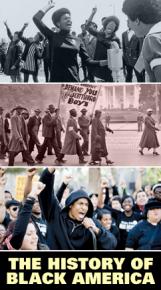Booker T. Washington and Black capitalism
With his conservative "self-help" philosophy, Booker T. Washington became the main spokesperson for Blacks at the end of the 19th century. explains.
UNEMPLOYMENT AND poverty are the plight of millions of Black workers in today's America. Yet paradoxically, Black political power has grown in the decades since the height of the civil rights and Black Power movement. This is because political power without economic power is empty.
But what kind of economic power? Many Black political leaders argue for a version of "Black capitalism"--that increased economic power within the confines of the capitalist system is the way to improve the lot of the mass of Black workers.
While starting with a correct premise--that political power is not enough--the conclusion that more Black business is the answer is mistaken. Nor are these ideas new. In fact, they have historical roots in the "self-help" philosophy of Booker T. Washington.
Washington was an emancipated slave who became the most prominent spokesperson for Blacks at the end of the 19th century. In 1880, Washington founded the Tuskegee Institute in Alabama, a technical school to train Blacks for skilled work.
Tuskegee stressed training to instill not only skills, but the "proper attitudes" and values--like hard work, sobriety, subservience to employers--in its students. Perhaps this was why Washington wrote that Tuskegee "has no warmer and more enthusiastic friends anywhere than it has among the white citizens ... throughout the state of Alabama and throughout the entire South."
Later, Washington created the Negro Business League, with the intent of creating a Black capitalist class. At a Business League conference in 1910, Washington called league members to be missionaries "in teaching the masses to get property, to be more thrifty, more; economical, and resolved to establish an industrial enterprise wherever a possibility presents itself."
Washington's strategy argued for Blacks to reject political action in favor of building capitalism within the Black community. In the context of the late 19th century, this strategy meant acquiescing to Jim Crow--the systematic stripping of political rights from Blacks, coupled with racist terror, which swept the South after the post-Civil War Reconstruction era.
One of Socialist Worker's earliest features was a monthly series on the history of the African American struggle in the U.S., from slavery to the present day.The History of Black America
In his 1895 speech to the Atlanta Exposition, a speech which came to be called "The Atlanta Compromise," Washington called on Blacks to "cast down your buckets where you are." In other words, he called for Blacks to accept segregation and to make the best of the situation they faced.
According to Washington, if Blacks faced oppression in the South, it was because of the victims' "dense ignorance," a condition which was to be changed by the establishment of more agricultural and industrial schools. It was no surprise, then, that Washington's scheme was supported by some of the leading northern businessmen, like Andrew Carnegie.
WASHINGTON'S STRATEGY--an accommodation to racism in the South--brought a powerful response from W.E.B. DuBois, the leading Black intellectual and activist of the early 1900s. In his 1903 Souls of Black Folk, DuBois attacked Washington. "So far as Mr. Washington apologizes for injustice, North or South, we must oppose [him]."
DuBois exposed the fallacies of Washington's case. Washington was asking Blacks to give up political rights and the struggle for equality in the hopes of raising themselves up. But, DuBois pointed out, Blacks' lives were not improving. In fact, as Blacks became increasingly disenfranchised, their lives were becoming worse. While Washington praised the white Southerners for supporting Tuskegee, DuBois noted, thousands of Blacks were being lynched throughout the South.
DuBois founded the Niagara Movement in 1905 to promote civil rights for Blacks. Soon after, the movement was absorbed into a broader civil rights organization, the National Association for the Advancement of Colored People (NAACP). The NAACP, founded in 1910, became the major mass organization fighting to win the acceptance of Blacks into mainstream American life. DuBois became one of the NAACP's chief officials.
The importance of DuBois' work was to reassert the full rights of Blacks. He argued for full civil and political rights as the precondition for equality for Black people. DuBois' book became the rallying cry for the more militant opposition to Washington, which began emerging during the First World War.
But the experience of the civil rights movement of the 1960s also shows that it is not enough to gain formal political equality in a system based on systematic economic inequality. Economic power is at the heart of Black oppression.
"Self-help" and "Black capitalism" represent a way to accommodate to a system that is itself the cause of Black oppression. Politics and economics cannot be separated. A successful movement for the emancipation of Black workers must also have the task of overthrowing capitalism.
This article first appeared in the June 1985 issue of Socialist Worker.



